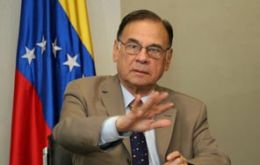MercoPress. South Atlantic News Agency
Tag: energy
-
Thursday, October 18th 2012 - 23:13 UTC
Hilary Clinton announces “energy diplomacy”, an issue of “wealth and power”

Energy is key to economic development and political stability, US Secretary of State Hillary Clinton said on Thursday, citing example of developing countries like India and China where energy needs are growing rapidly along with their economies.
-
Saturday, March 17th 2012 - 07:21 UTC
YPF is an Argentine asset run by Spanish investors, De Vido tells Madrid

Argentine Planning Minister Julio de Vido lashed out at Spanish Industry Minister José Manuel Soria by saying that oil company YPF is an Argentine corporation run by Spanish investors and should not be considered an asset of the European country.
-
Thursday, January 5th 2012 - 05:33 UTC
In a decade Brazil must increase power generating capacity by 56%

Brazil must expand electricity production over the next decade by an amount equivalent to the power generated by three Itaipú hydroelectric dams, according to a study released Wednesday by the state-run Energy Research Corporation, EPE.
-
Wednesday, December 14th 2011 - 18:17 UTC
In summer take your ties off and help save power, says Chilean government

As has happened in other countries, Chilean Energy minister Rodrigo Alvarez has officially launched the campaign, “in summer, no ties” to help save with the use of air conditioners mainly in government offices.
-
Wednesday, December 7th 2011 - 05:39 UTC
CFK begins her second mandate with the budget and energy bill in the red

Cristina Fernandez takes the re-election oath on Saturday with government accounts and the energy bill in red, which contrasts with the surplus condition enjoyed by Argentina when she first took office four years ago.
-
Saturday, October 29th 2011 - 03:04 UTC
US bio-fuel production increase: fact or wishful thinking?

A recent study, released on 11 October, “Bio-fuel Markets and Technologies” released by Pike Research states that the global bio-fuel market will double within the next decade to 183.3 billion dollars from its current level of 82.7 billion, with ethanol production accounting for 78 billion of future worldwide bio-fuel production, while predicting that bio-diesel production will reach 25.5 billion.
-
Tuesday, July 12th 2011 - 15:37 UTC
Argentina continues to block sale of Paraguayan power to Uruguay

The sale of power from landlocked Paraguay to Uruguay continues to be delayed because Argentina has come up with more demands before it allows transmission through its grid, according to Paraguayan officials.
-
Wednesday, June 15th 2011 - 19:27 UTC
Energy rich Venezuela, short in power and forced to ration electricity

Big electricity users in Venezuela have been told to cut consumption or face increased charges. Consumers who save energy will be in line for discounts, officials said. The move comes after a series of recent power failures, the most recent last Friday and Saturday when outages affected most of western Venezuela.
-
Thursday, April 14th 2011 - 19:43 UTC
Venezuela and Argentina have the highest inflation rates in South America

Venezuela and Argentina recorded the highest rates of inflation in South America during the first quarter of 2011 according to the latest data available.
-
Saturday, March 19th 2011 - 07:19 UTC
Argentina on its way to become net energy importer, claim former ministers

Eight of Argentina's former energy secretaries have released another document highly critical of the government's energy policies. The document, signed by most of the people who have run the Energy Secretariat since Argentina's return to democracy in 1983, is a scathing criticism of government policy.
